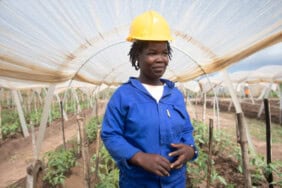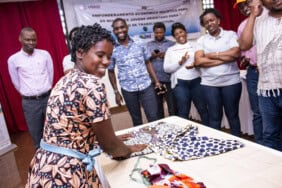This website uses cookies so that we can provide you with the best user experience possible. Cookie information is stored in your browser and performs functions such as recognizing you when you return to our website and helping our team to understand which sections of the website you find most interesting and useful.
How the Bantwana Initiative Redefines Community-Led Development in Africa
Nearly twenty years ago in a community about sixty miles from Kampala, Uganda, there was a woman who liked to be called jajja, or grandmother in Luganda. When sick children were admitted to Mityana Hospital, a regular occurrence at the height of the HIV epidemic, hospital workers would call jajja to sit with them. Everyone knew who she was.
At the time, Susan Kajura was a Ugandan activist deeply involved in supporting communities through the HIV/AIDS crisis, and Gill Garb, a senior staff member of the Boston-based international NGO, World Education, Inc. When they met jajja, she was caring for twenty to thirty orphans, none of whom were her relatives. The children all regularly attended school, which provided them with free education and uniforms. A reverend at the local church held fundraisers to support any additional needs, and a doctor at Mityana provided free health services.
In many countries, prior to the HIV epidemic, people didn’t use the word orphan. Your aunts and uncles were your mothers and fathers; your extended family was your support system. The epidemic altered this dynamic after the death of so many adults left behind countless orphaned children. Soon, many children had no family at all.
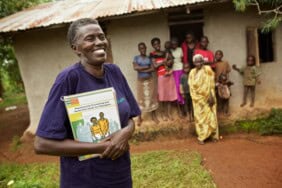
Susan and Gill saw how community and family systems provided holistic care to orphans, and they wanted to build on existing community-led responses. The seed of World Education’s Bantwana Initiative grew out of this experience, leading to a rethinking of how development funding was channeled into Africa at the time.
In 2006, alongside local groups and individuals working at the frontline of the HIV epidemic and with $50,000 in seed funding, Gill Garb founded the Bantwana Initiative. The initiative aimed to support grassroots efforts and locally led solutions to address gaps in services for HIV-affected orphans and vulnerable children (OVC) in eastern and southern Africa.
Bantwana’s goal has always been to ensure that people and organizations leading the drive toward healthy, protected, and educated communities in sub-Saharan Africa have the resources they need. Today, its teams in Uganda, Zimbabwe, and Eswatini have evolved into independent national organizations, carrying on this work together to support sub-Saharan Africa as a regional network.
How They Got Here
Bantwana teams in seven countries across sub-Saharan Africa established strong relationships with governments, communities, funders, and local organizations to support holistic care from HIV-sensitive case management to education, child protection, and economic strengthening for young women. The U.S.-based World Education team provided technical assistance, budgeting, and reporting support.
Bantwana began working in Zimbabwe in 2008. Bantwana Zimbabwe was established in 2018 to work with USAID on an OVC program. Today, as a private voluntary organization under the governance of a seven-member Zimbabwean board, Bantwana Zimbabwe manages $18 million in annual programming. In Eswatini, Bantwana has implemented OVC programming since 2008. In 2021, Bantwana Eswatini was established to further direct funding to local solutions. Bantwana Initiative Uganda was founded in 2023, an official change that represented the strong existing local leadership.
Over the last decade, the teams began to form independent, locally registered and governed organizations. These shifts, led by long-time in-country Bantwana experts, responded to the changing needs and contexts of each country. Bantwana prioritizes innovation, providing a platform for staff at all levels to contribute ideas when challenges arise. Flexible funding from a range of donors also allowed Bantwana to pilot innovative approaches and scale up community-led interventions.
Bantwana programs implemented in Malawi and Mozambique continue under the umbrella of World Education and JSI, and multi-year programs in Tanzania and Zambia have come to an end.
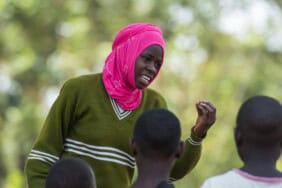
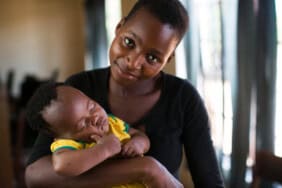
Kirinda Village Saving and Loans Association Group. Photo Robin Hammond/Panos.
Nothing For Us Without Us
Guided by the principles of ubuntu, which emphasize the interconnectedness of individuals and communities, Bantwana teams remain committed to community-centered solutions and listening to the people most impacted by new programs and tools. This approach brings people together to develop shared visions, build trust, and co-create solutions.
When providing technical assistance, Bantwana serves as a bridge between government priorities, donor requirements, and community needs. Rather than imposing solutions, Bantwana focuses on strengthening existing systems and developing context-appropriate approaches. This commitment to local leadership has led to meaningful results across the region. In Uganda, Bantwana helped strengthen networks of trusted child protection workers and educators. In Zimbabwe, Bantwana participated in a collaborative effort with USAID, UNICEF, and the government to create a sustainable national case management system.
Since 2013, Bantwana has helped dozens of local organizations build their capacity and qualify for direct USAID funding, including Zimbabwe’s first local USAID grant recipients and seven organizations in Uganda over two years.
As these organizations lead the way and mentor others, they demonstrate the power of truly local solutions. By working within existing frameworks, fostering collective learning, and maintaining ongoing dialogue with all stakeholders, Bantwana is building a sustainable model for community-driven change across sub-Saharan Africa.
Success will not happen if we are only ticking boxes and not looking at optimized outcomes. Commitment to results is very, very important.” – Patience Ndlovu, former vice president, the Bantwana Initiative
Kyenjojo Model Primary School, Child Rights Club. Photo Robin Hammond/Panos.
The Vision For a Network
Over the years, Bantwana has piloted promising interventions and supported the scale-up of proven approaches across the region. Our teams in Zimbabwe, Eswatini, and Uganda have shared resources and knowledge to strengthen each others’ work. Bantwana’s efforts in Zimbabwe to develop the National Case Management System provided a framework for the team in Eswatini as they developed a similar system. Bantwana’s Siyakha Girls economic empowerment model has now been implemented in Malawi, Mozambique, Namibia, South Africa, Tanzania, and Zambia.
In 2023, Bantwana leaders started to discuss the idea of the Bantwana Regional Network. They envisioned increased knowledge-sharing and multi-country programming and research to advance work that supports orphans and vulnerable children, adolescents, and young men and women—as well as their families and caregivers. After extensive planning meetings and working through legal and fiduciary requirements, Bantwana launched the Bantwana Regional Network in December 2024, with registration and a small secretariat in Zimbabwe.
Building on decades of collaboration and commitment to locally led development, the Bantwana Regional Network unites the expertise of each team to amplify our presence, profile, and community of practice throughout the region. Together, the Bantwana Regional Network is creating a powerful African movement that supports children, youth, and their communities.
